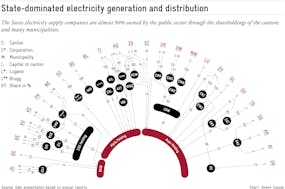The backers of the sovereign money initiative have high hopes the reform they’re after will prompt breaks for taxpayers and the economy and “real francs in our bank accounts.” The Swiss National Bank sees things differently: at its last annual general meeting, chairman Thomas Jordan warned accepting the proposal would expose the Swiss financial system to an unparalleled experiment. It would require a complete upheaval of today’s monetary system, “without raising financial stability or bringing any other visible advantages with it.”
As set out in the previous blog, sovereign money would eliminate liquidity and solvency risks, as it would oblige commercial banks virtually to cover their current accounts. But even today, the “creation of electronic money” decried by backers of the initiative can be influenced by the SNB’s minimum reserve requirements. And that credit creation by private sector banks for the economy isn’t exactly unimportant is evident in the European Central Bank’s current generosity towards banks lending to businesses.
Since the financial crisis, there have been major steps to strengthening financial stability. Big banks in particular have significantly cut their balance sheets (deleveraging). And many new regulations and measures have been passed under the Basel III and “Too big to fail” rules, strengthening banks’ capital, lowering their liquidity and solvency risks, and facilitating their restructuring or even liquidation. This step by step process is set to continue, with some measures (eg Net Stable Funding Relation) taking until 2019.

A sovereign money reform would be an experiment with a hugely unpredictable outcome. (Picture: Fotolia/Peshkov)
Uncertainty would be certain
Sovereign money would also not resolve numerous other risks in the banking and financial system:
- Inflation (or Deflation) of goods and services. In a sovereign money regime, the payment system is separate from the distribution of credit. But the text of the Vollgeld Initiative does not clarify which money supply component (M1, M2, M3) would apply – in other words, how thick the “firewall” between the “payments-transaction bank” and the “remaining credit bank” would be (see Baumberger, Walser/2014). Were sovereign money to be defined very narrowly, the impact would be limited. In the case of a thick wall – and only limited credit business – matters could lead to the aforementioned structural break. The rules under which the money supply is to be managed remain completely open too.
- Swings in exchange rates and asset values. There is the serious risk the very announcement of a sovereign money reform would impact the exchange rate. Individual steps leading to sovereign money – preparations for the transition, the immediate aftermath, and the new normality, would be accompanied by friction and tension. Participants in the money and financial markets would be bound to react to the upheaval – leading to corresponding uncertainties and tensions in capital markets.
- Crises in state finances. The first article of the text of the initiative is telling. “The Confederation guarantees the supply of money and financial services to business. It can thereby deviate from the principle of economic freedom.” So the supporters are really looking for the abolition of the capitalist banking system: that’s why financial products would need to be approved, proprietary trading restricted and minimum holding periods predetermined for financial investments. Lending to business would effectively take place on a planned economy basis. The sovereign money regime observes the rules of double bookkeeping, As sovereign money stands on the liabilities side of the SNB’s balance sheet, there must be a counter entry on the assets side. Whether a central bank – which under the sovereign money initiative is so directly linked to the state budget and state debt – can remain independent, is doubtful. A look at history leaves scant grounds for optimism. Whenever politicians have had free access to the money printing presses, crises in state finances were never far behind.
A thoroughly grotesque idea
The sovereign money initiative would not only fail to meet its aim of a crisis-free monetary and financial system, the SNB would also lose its independence. It would be grotesque for Switzerland of all places, one of the world’s most important financial centres, to undergo such shock therapy. .
Lenin is credited with saying: “The best way to destroy the capitalist system is to debauch the currency.” Here, at least, he got it right.





